How 24-year-old Ankush Saha overcame his disability and took the big swing to shine in golf
Ankush Saha was one among the 150 golfers with intellectual disabilities to have played at the 2019 Special Olympics World Summer Games in Abu Dhabi, where he went on to win a silver medal for the nation.
Sports is known to be a triumph of the human spirit. Any sport for that matter - whether it is football, archery, golf, or wrestling, requires stamina and strength. While it is challenging for able-bodied athletes themselves to be able to master a sport, it is all the more difficult for people who are differently-abled.
However, 24-year-old Ankush Saha has braved all odds and outshined himself in the game of golf despite his disability. He was one among the 150 golfers with intellectual disabilities to have played at the 2019 Special Olympics World Summer Games in Abu Dhabi. He even went on to win the silver medal for India.
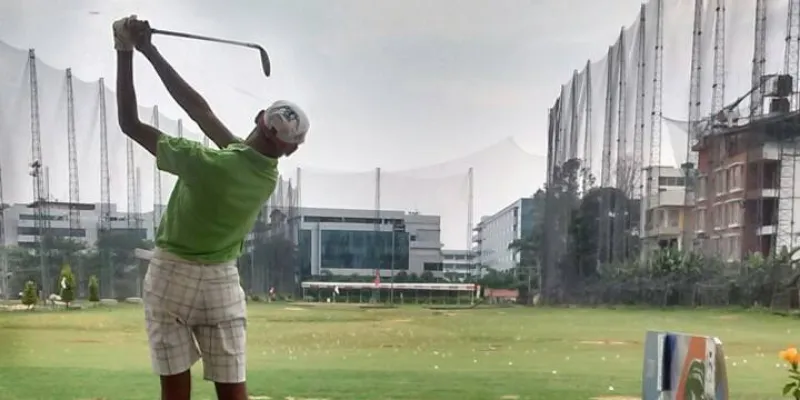
24-year-old Ankush Saha playing a game of golf.
From a person who used to struggle with determining distances and assessing speed to becoming an adept golfer, Ankush has come a long way.
Speaking to YourStory, he says:
“I found it really tough when I started off with playing golf. I was unable to judge certain basic aspects like gradient, wind conditions, and directions due to which I had to put in a lot of effort to learn the technical side of the game.”
Today, Ankush has a host of laurels to his credit. In 2014, he won the second level at the Special Olympics Golf Masters in Macao, China, and after three years, he bagged the bronze after playing the fifth level in the same tournament. His achievements also found a mention in the prestigious Limca Book of Records in 2015.
Also read: Meet Divyanshu Ganatra, India's first blind solo paraglider
Ankush’s tryst with golf
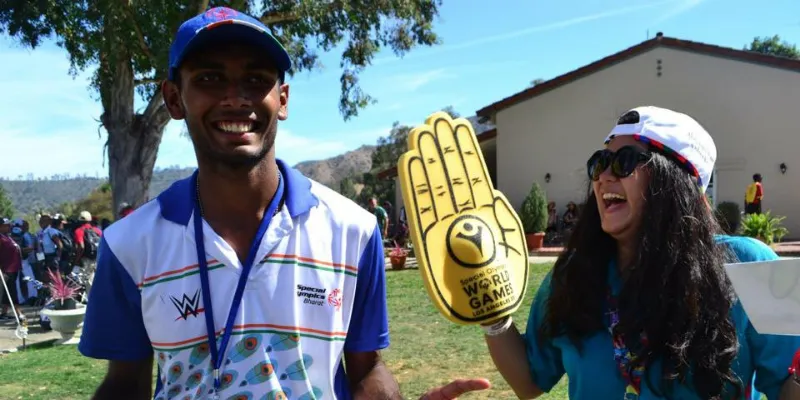
Ankush Saha (left) at the Special Olympics Bharat.
Ankush first started playing golf when he was 13 years old. He began developing an interest in the game after watching his father, Lieutenant Colonel Bipra Saha, play.
“When I was young, my father used to take me along to the golf course. One fine day, I tried my hand at it and from then on, there was no looking back,” Ankush recollects.
Within a span of two weeks, his swing and shot showed the sign of a skillful player in the making. This was observed not only by his father, but also by a number of other golfers playing in the vicinity.
Recognising the talent of his son, Bipra Saha immediately placed him under the guidance of Bamby Randhawa, one of the leading golf coaches in the country. This led Ankush to join the Touche Golf School in Bengaluru for a year. It was under Randhawa’s training that he played his first-ever South Zone Tournament in 2008.
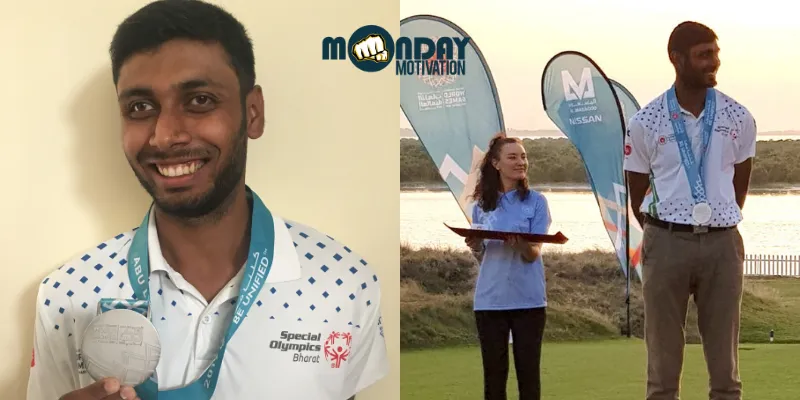
Ankush after winning a silver medal at the 2019 Special Olympics World Summer Games in Abu Dhabi.
Since then, Ankush’s love for golf has only increased over time.
“I tend to derive a lot of satisfaction whenever I play golf. It somehow helps me to stay positive and upbeat. Besides, it gives me an opportunity to represent India at a global level,” Ankush says.
The 24-year-old is now gunning for gold at the upcoming Asia Pacific Golf for Special Olympics.
Stumbling blocks along the way
Ankush was born after a tough childbirth. His mother, Champa Saha, had to undergo a cesarean after experiencing stressful fetal condition.
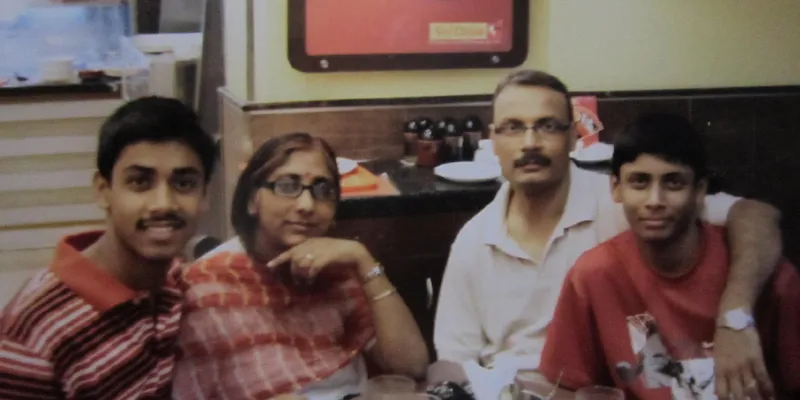
Ankush Saha (extreme right) with his parents and brother.
“Right at the infancy stage, Ankush suffered repeated seizures. The doctors claimed that his mental condition could be evaluated only after he grew up. A few years later, we began noticing delays in speech, difficulties in mobility, sensory perception, and grasping power. That was when we realised that he is intellectually disabled,” says Ankush’s father, Bipra Saha.
Ankush’s parents went through a rough patch while trying to understand his state of mind. His father took an early retirement from the Indian Army so that he could take care of Ankush and support him through the journey, while his mother decided to undergo training to be a special educator in an attempt to comprehend Ankush’s condition better.
Later, Ankush went on to study at Spastics Society of Karnataka in Bengaluru. But, very soon, he reached a gridlock due to his inability to cope with academics.
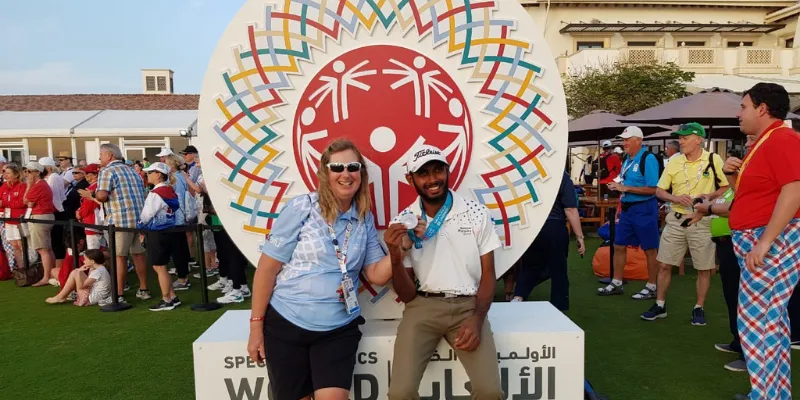
Ankush at the World Para Athletics Championship.
“At one point I figured that my son used to sit idle in the classroom. Sometimes he would simply step out of the class, go to the playground and stare at all the athletes. That’s when it occurred to me that Ankush might do well for himself in sports,” says Bipra Saha.
Ankush’s intelligence quotient (IQ) was 66, which was way below the normal score of 95 to 100. He found it hard to get past even routine activities like crossing the road, socialising with people, and connecting actions with consequences. However, this did not bog him down. He battled all the obstacles with sheer hard work and determination and went on to become an accomplished golf player.
“I am extremely proud of Ankush. I am lucky to have a son like him. He is truly a bundle of talent and I am sure he’ll go a long way,” Bipra Saha says with a smile.
Also read: From Kashmir to the US, the story of the valley's first woman wheelchair basketball player
Differently-abled people in sports
The participation and engagement of differently-abled in sports has been low in India. Though it is one of the greatest demonstrations of inclusivity, it does not garner enough attention compared to other sporting events.
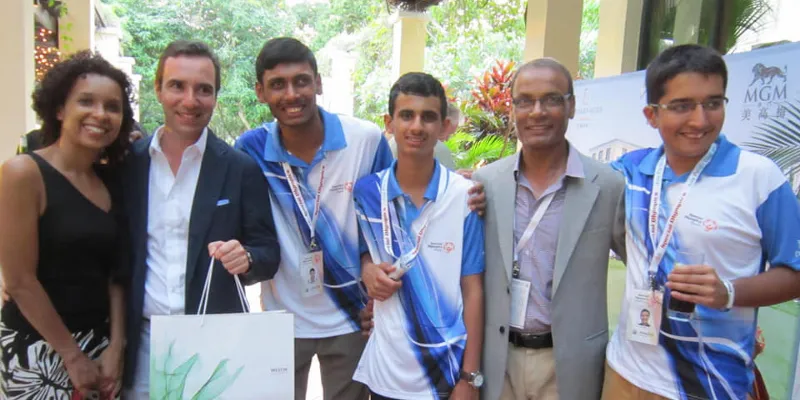
Ankush Saha at the Special Olympics Golf Masters in Macao, China.
Indian athletes bagged a total of 368 medals in the 2019 Special Olympics World Summer Games in Abu Dhabi. This shows that people with disabilities are at par with other athletes when it comes to making the country proud through their achievements in sports.
“Several athletes with disabilities are showing an interest in the field of sports and tend to put in a lot of time and effort to succeed. It is time we acknowledge this and support them in their endeavour,” says Air Marshal Denzil Keelor, Founder, Trustee, and CEO, Special Olympics Bharat.
Also read: Meet Nisha Gupta, the paraplegic athlete who believes disability is just a state of mine






